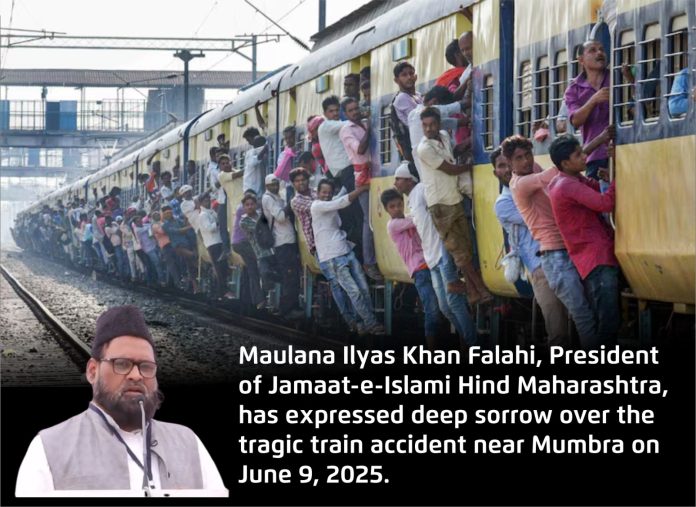Mumbai— Maulana Ilyas Khan Falahi, President of Jamaat-e-Islami Hind (JIH) Maharashtra, has expressed deep sorrow over the tragic train accident that occurred near Mumbra on June 9, resulting in multiple casualties and injuries. He described the incident as a grim reminder of chronic systemic neglect in Mumbai’s suburban railway network.
“The loss of precious lives due to overcrowding on Mumbai’s suburban trains is a grim reminder of systemic neglect and the urgent need for reform,” Maulana Falahi stated.
In response to the tragedy, JIH Maharashtra has put forth a series of urgent demands aimed at preventing such incidents in the future:
Transparent and time-bound enquiry into the accident
Adequate compensation for the families of the deceased
Free and full medical care for the injured
Immediate implementation of automatic door-closing systems on local trains
Increased frequency of trains during peak hours and better management
Robust investment in railway infrastructure and staff training
Regular safety audits and strict accountability mechanisms
JIH Maharashtra emphasized that this incident is not isolated. Recurrent accidents, including passengers falling from footboards due to overcrowding, expose a severe failure of governance. “Safety is not a luxury—it is a basic right,” said the organization, urging authorities to take responsibility.
While addressing immediate needs, the group also called for long-term urban planning reforms. It advocated for exploring the 15-Minute City model—a planning approach that ensures all essential services are within a short walk or cycle from residents’ homes.
“This model is practical and implementable in cities like Pune, Nagpur, or Navi Mumbai,” JIH noted. “Even in Mumbai, zonal application of this concept in emerging development corridors can help reduce commuter pressure and enhance quality of life.”
The organization concluded by urging city planners and policymakers to transition from reactive crisis management to proactive, people-centric urban governance, ensuring that safety, accessibility, and human dignity form the foundation of future development.




